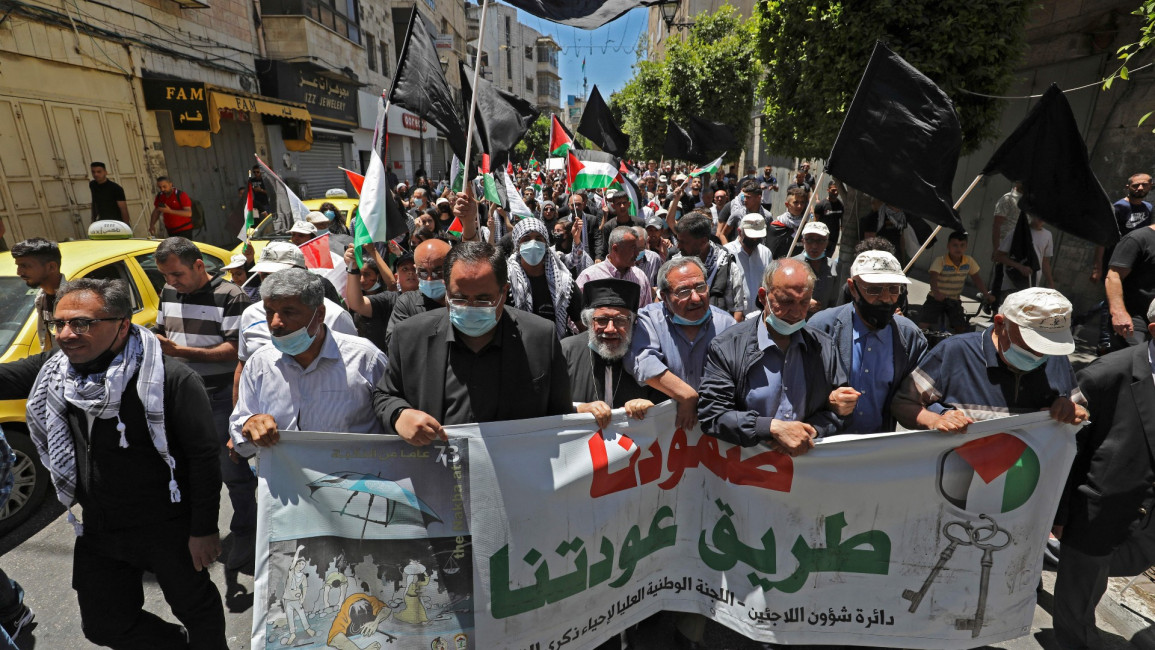Palestinians rally in West Bank to mark Nakba Day
Protesters also demonstrated against continued Israeli occupation and the ongoing bombardment of the Gaza Strip, which has come under deadly strikes by Israeli forces.
At least 140 Palestinians, including 39 children, have been killed in the Gaza Strip since Monday. Some 950 others have been wounded.
In the occupied West Bank, Israeli forces have killed at least 13 Palestinians.
Solidarity rallies were also held around the world to demonstrate Israel's aggression and mark Nakba Day.
Hundreds of people gathered in several cities across the United Kingdom, including in the capital London, to express solidarity with Palestinians.
Similarly, hundreds rallied in the Australian city of Melbourne to protest Israeli military attacks on Gaza.
Earlier this week, thousands of people in the US capital of Washington, DC marched in solidarity with the Palestinians.
On Tuesday, hundreds of protestors gathered in front of the State Department building, joined by Palestinian, Turkish and US groups and Orthodox Jews as well as Congresswoman Rashida Tlaib.
Paris braced on Saturday for a Paris march in support of the Palestinians, despite a ban by authorities.
Read also: Sheikh Jarrah and a Nakba of past and present
Millions of Palestinians and their supporters worldwide will mark 73 years since the "Nakba" on May 15, a day that coincides with the Israel's declaration of independence.
Israel was formed amid a war that started in 1947 between Palestinians backed by some Arab states and Jewish settlers who had been arriving in hordes in Palestine after persecution in Europe and the development of a form of Jewish nationalism known as Zionism.
During the 1948 war, some 750,000 Palestinians were expelled from their native land by Zionist militias in a campaign that included murder, rape and intimidation.
Today, those Palestinians and their descendants number around 5.7 million and are mostly residing in the occupied West Bank, Gaza, Jordan, Lebanon and Syria.
The Palestinians say they are entitled to a right of return to their homes – a notion Israel rejects because it fears that if it is implemented, then the native Palestinians will become a majority in the country.
Follow us on Facebook, Twitter and Instagram to stay connected

![Trump's warm greeting to Netanyahu contrasted with Kamala Harris's critical reception [Getty]](/sites/default/files/styles/image_330x185/public/2024-07/GettyImages-2162908988.jpg?h=69f2b9d0&itok=OLc5dL88)
![The brutal assault on Khan Younis has killed dozens and displaced thousands more [Getty]](/sites/default/files/styles/image_212x120/public/2024-07/GettyImages-2162526709.jpg?h=d3eda8cf&itok=HCP84AvQ)
![Members of the Algerian delegation threw roses into the Seine [Getty]](/sites/default/files/styles/image_330x185/public/2024-07/GettyImages-2162980872.jpg?h=199d8c1f&itok=h_3o_TOL)